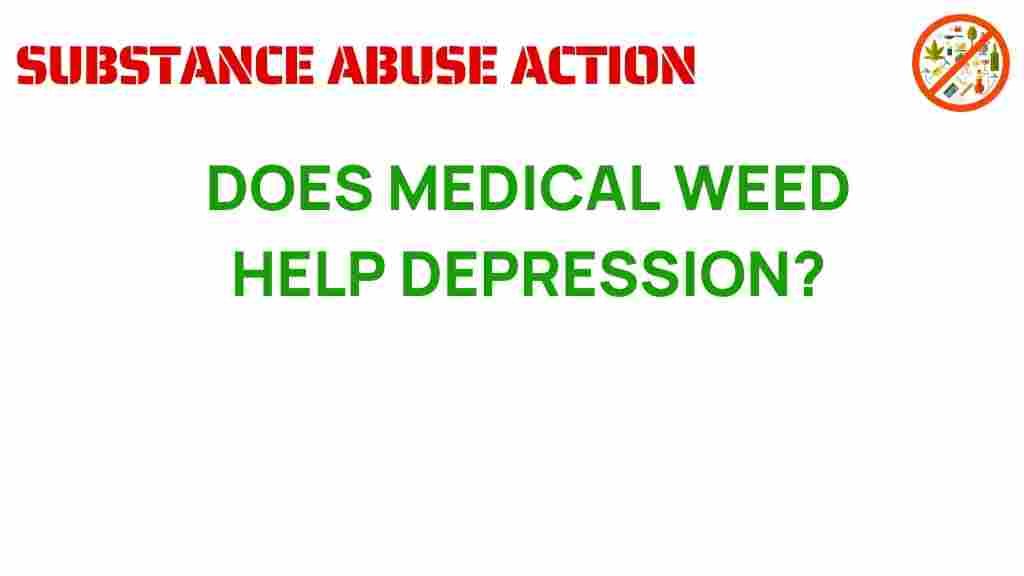Exploring the Connection: Does Medical Weed Alleviate Depression?
As the stigma surrounding cannabis diminishes, more individuals are exploring medical marijuana as a viable depression treatment. With the rising interest in alternative therapies for mental health, many are curious about the potential benefits of cannabis in managing psychiatric disorders like depression. This article delves into the relationship between medical marijuana and depression, highlighting the benefits, patient experiences, and the growing acceptance of cannabis in wellness practices.
Understanding Depression and Its Impact on Mental Health
Depression is a prevalent mental health disorder that can affect anyone, regardless of age or background. Characterized by persistent sadness, loss of interest, and a lack of motivation, it can significantly impair an individual’s quality of life. Traditional treatments for depression often include:
- Antidepressant medications
- Psychotherapy
- Lifestyle changes
- Exercise and nutrition
However, these conventional methods do not work for everyone. As a result, many are turning to alternative therapies, including cannabis benefits derived from medical marijuana.
How Does Medical Marijuana Work for Depression?
Medical marijuana interacts with the endocannabinoid system (ECS) in our bodies, which plays a crucial role in regulating mood, stress response, and overall mental health. The two primary compounds in cannabis, THC (tetrahydrocannabinol) and CBD (cannabidiol), have been studied for their effects on depression:
- THC: Known for its psychoactive effects, THC may elevate mood and provide temporary relief from feelings of sadness.
- CBD: Non-psychoactive, CBD is believed to have anxiolytic and anti-inflammatory properties, making it a promising candidate for long-term management of depression.
Research suggests that these compounds can help restore balance in the ECS, potentially alleviating symptoms associated with depression.
Patient Experiences: Real-Life Testimonials
Many patients have shared their experiences with using medical marijuana as part of their depression treatment. Here are some common themes from their stories:
- Empowerment: Patients often feel empowered by having more control over their treatment options.
- Improved Mood: Many report an uplift in mood and a reduction in depressive symptoms after using medical marijuana.
- Side Effects: Some patients find cannabis to have fewer side effects compared to traditional antidepressants.
While individual results may vary, these testimonials indicate that medical marijuana can play a significant role in enhancing mental health and wellness.
Scientific Research on Cannabis and Depression
Numerous studies have explored the efficacy of cannabis in treating depression:
- Research Findings: Some studies indicate that cannabis can reduce the severity of depressive symptoms, particularly in patients who have not responded well to conventional treatments.
- Cannabinoid Therapy: Investigations into cannabinoid therapy suggest that it may improve mood and emotional regulation.
- Long-term Effects: More research is needed to understand the long-term effects of cannabis use on mental health.
While the evidence is promising, it is vital to approach cannabis treatment cautiously and consult healthcare professionals for personalized guidance.
Step-by-Step Process: Using Medical Marijuana for Depression
If you are considering medical marijuana as a part of your depression treatment, here is a step-by-step guide:
- Consult a Healthcare Provider: Discuss your symptoms and treatment history with a qualified healthcare professional who understands cannabis therapy.
- Obtain a Medical Marijuana Card: If approved, you will need to apply for a medical marijuana card in your state.
- Choose the Right Strain: Work with your provider to find a cannabis strain that is suitable for your needs, focusing on THC and CBD ratios.
- Start Low and Go Slow: Begin with a low dose and gradually increase it while monitoring your symptoms and side effects.
- Track Your Progress: Keep a journal to document your experiences, noting any changes in mood, energy levels, and overall mental health.
Potential Risks and Considerations
While medical marijuana has potential benefits, it is essential to be aware of the risks:
- Dependency: Some individuals may develop a reliance on cannabis for mood management.
- Side Effects: Common side effects include drowsiness, altered judgment, and potential exacerbation of anxiety in some users.
- Legal Status: The legality of medical marijuana varies by location, so it is crucial to stay informed about local laws.
Engaging in open communication with healthcare providers can help mitigate these risks and ensure a safe approach to treatment.
Exploring Other Alternative Therapies for Depression
In addition to medical marijuana, various alternative therapies can complement traditional treatment methods:
- Mindfulness and Meditation: Practicing mindfulness can help reduce symptoms of depression and improve overall well-being.
- Yoga: Combining physical movement with breath control, yoga has been shown to alleviate stress and improve mood.
- Herbal Supplements: Some individuals find relief with herbal remedies, such as St. John’s Wort and omega-3 fatty acids.
- Acupuncture: This ancient practice may help balance energy and improve mental health.
Integrating these therapies can enhance holistic wellness and support mental health.
Troubleshooting Tips for Using Medical Marijuana
If you encounter challenges while using medical marijuana for depression, consider these troubleshooting tips:
- Adjust Dosage: If you experience adverse effects, consult your healthcare provider for dosage adjustments.
- Switch Strains: Different strains affect people differently; trying a new strain may yield better results.
- Combine Therapies: Incorporate other treatments, such as therapy or exercise, for a more comprehensive approach.
Conclusion: A Path Toward Wellness
Exploring the connection between medical marijuana and depression highlights a growing interest in alternative therapies for mental health. While patient experiences and scientific research suggest that cannabis may offer benefits for managing depression, it is essential to approach this treatment with caution and under professional guidance. By combining medical marijuana with other holistic practices, individuals may find a pathway toward improved mental health and overall wellness.
For more information on mental health and alternative therapies, visit the National Institute of Mental Health and explore their resources.
As we continue to understand the complexities of mental health, patient experiences will play a vital role in shaping the future of depression treatment and the acceptance of cannabis in wellness practices.
This article is in the category Treatment and created by SubstanceAbuseAction Team
